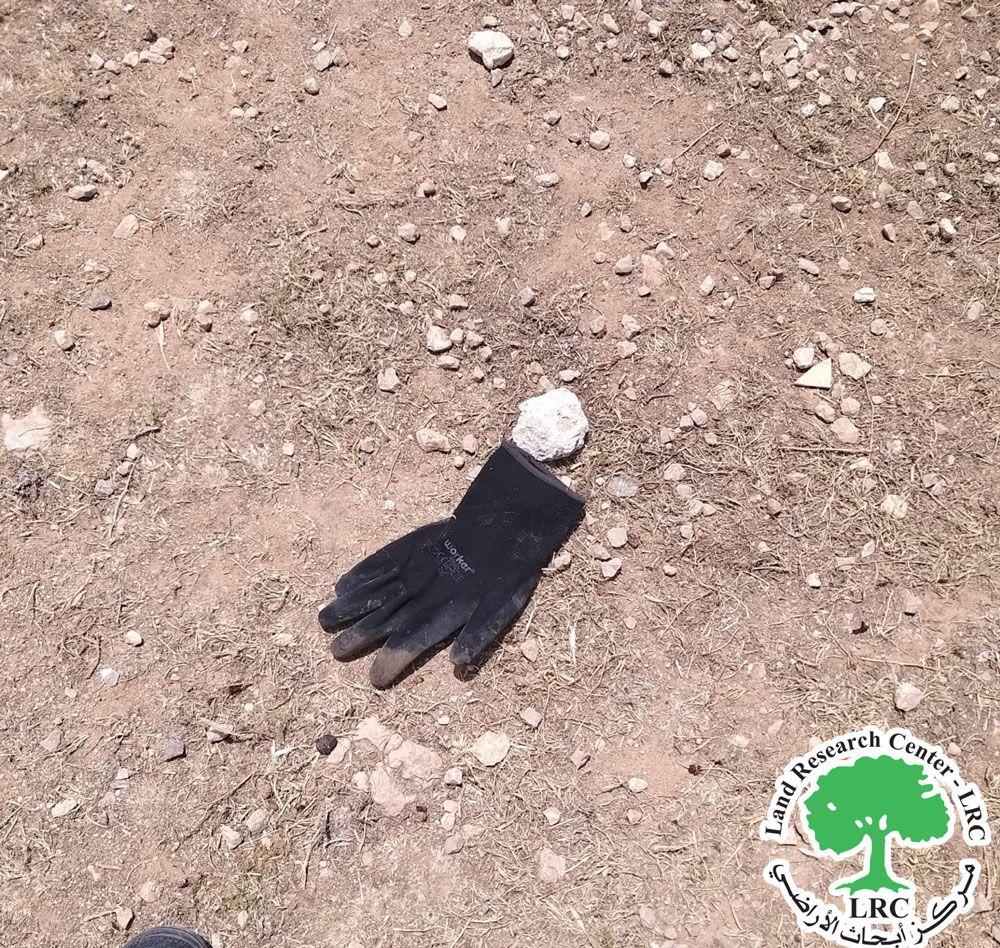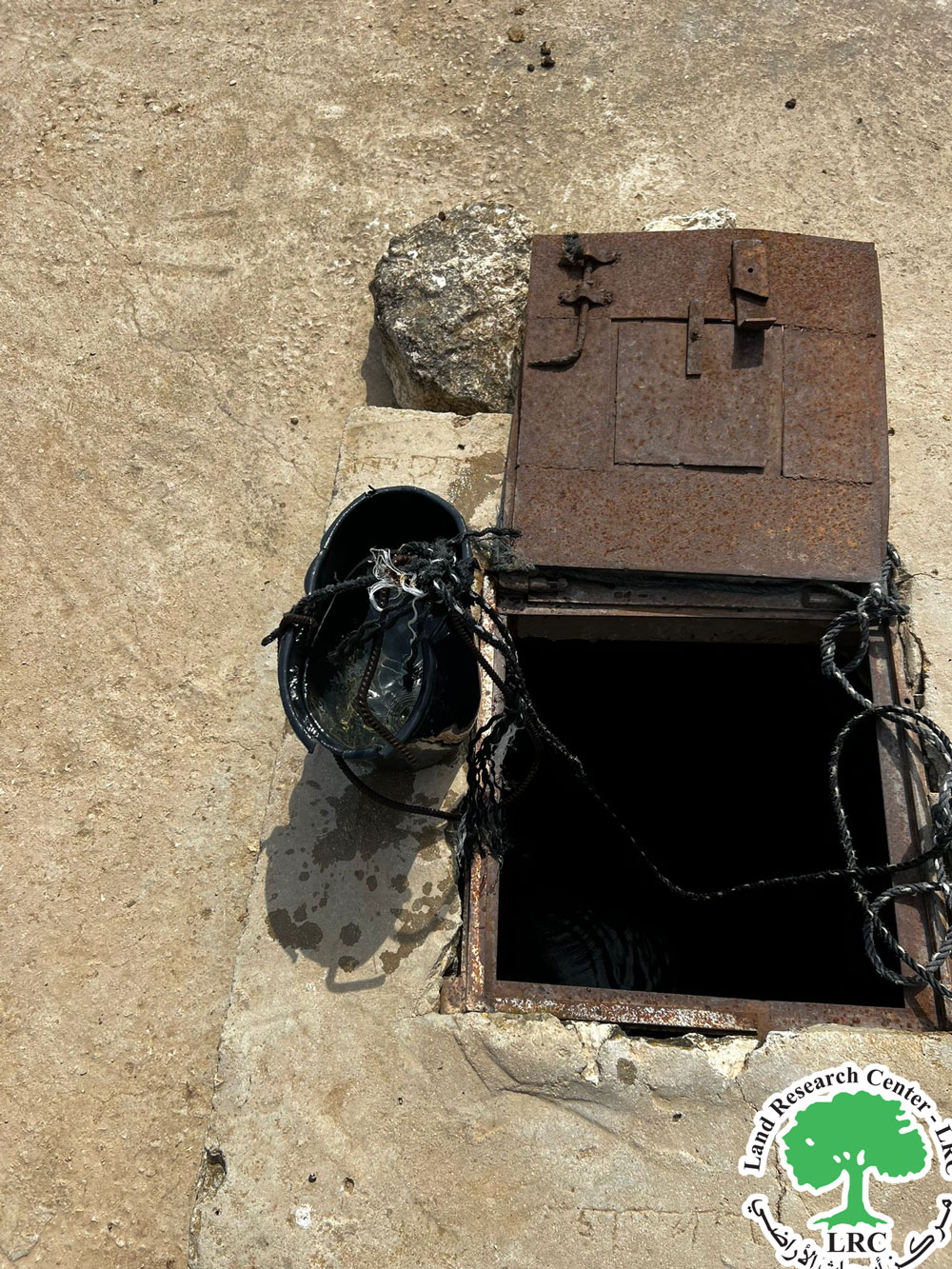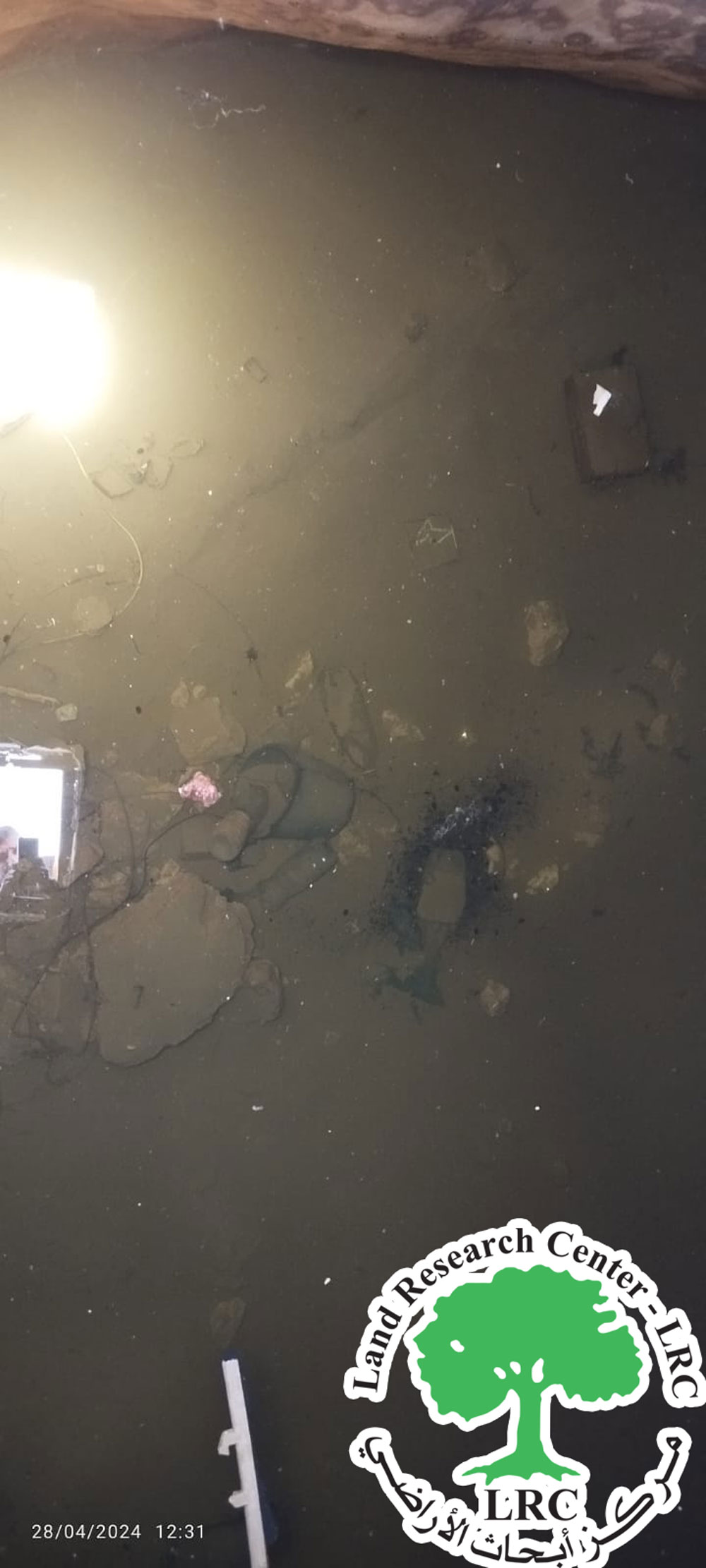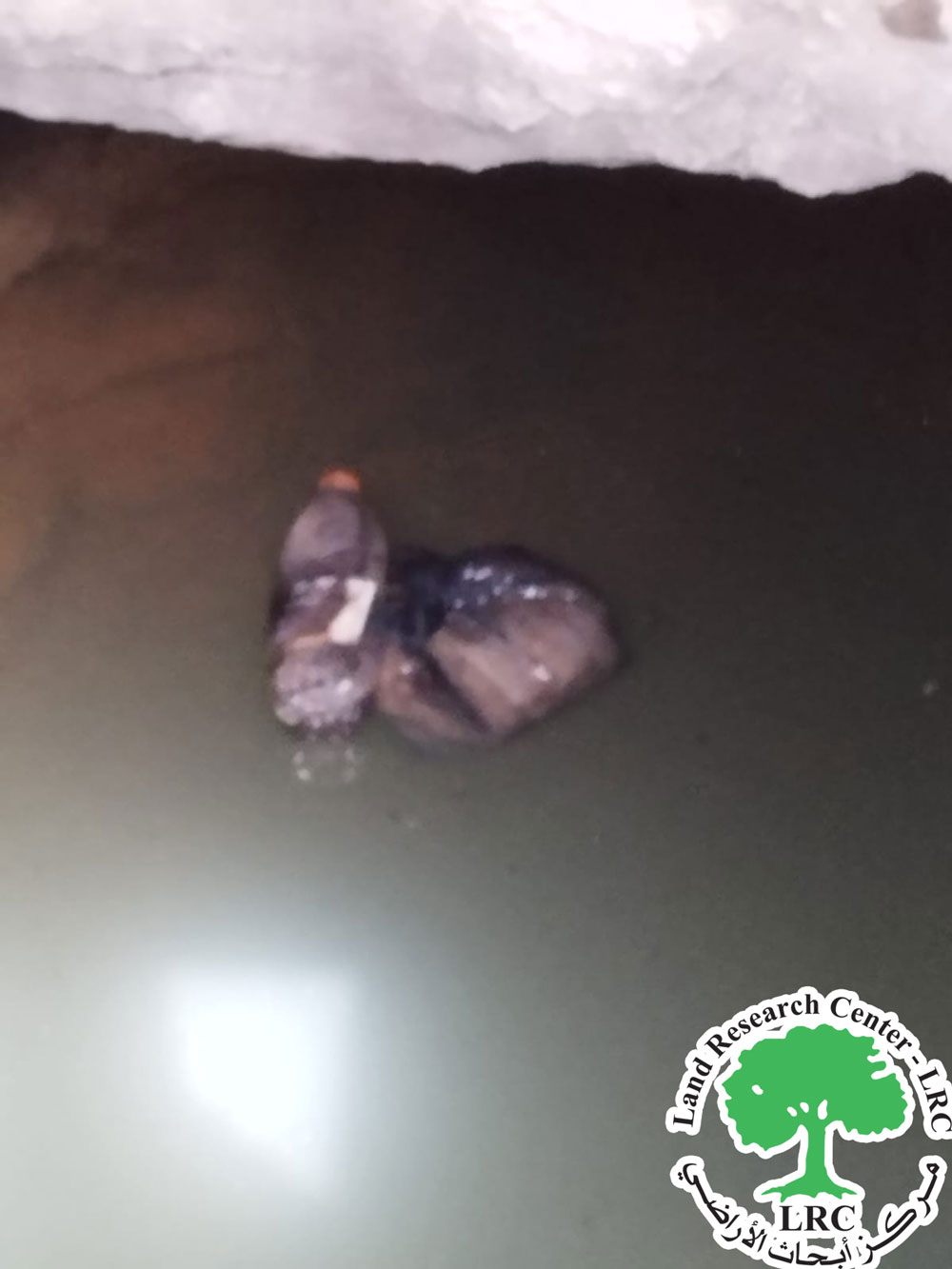2024-04-28
الاشتباه بتسميم المستعمرين لآبار مياه زراعية في بلدة السموع جنوب الخليل
الانتهاك: تلويث مياه آبار.
تاريخ الانتهاك: 28/04/2024.
الموقع: العتيرية – بلدة السموع/ محافظة الخليل.
الجهة المعتدية: مستعمرون متطرفون.
الجهة المتضررة: المزارع عبد الله أبو عواد.
التفاصيل:
بدى الارباك والخوف ظاهراً على المزارع عبد الله محمد أبو عواد من بلدة السموع جنوب الخليل، بعد أن لاحظ بأن المستعمرين ألقوا مواداً غريبة في آبار المياه الزراعية التي يروي أغنامه منها، حيث يعتقد أبو عواد بأن هذه المواد قد تكون سامة، والهدف منها الحاق الضرر بمواشيه.
ويقيم أبو عواد في حي الدير جنوب بلدة السموع، ويعمل في الزراعة وتربية المواشي، حيث يملك حوالي ( 30 دونماً) من الأراضي في منطقة العتيرية، ويستأجر حوالي ( 300 دونم) أخرى من مواطنين في محيط أرضه، لتشكل هذه المساحات مصدر أعلاف وإطعام لقطيع المواشي الذي يملكه ( حوالي 400 رأس).
ومنذ سنوات عديدة يقوم أبو عواد بفلاحة هذه المساحات، وحصدها والرعي فيها، وري أغنامه من آبار الجمع التي يستأجرها في تلك المنطقة، لكن منذ تاريخ ( 7/10/2023) وبالتزامن مع اندلاع الحرب على غزة، لم يتمكن أبو عواد من فلاحة أرضه مع انطلاق موسم حراثة الأرض وزراعتها (تشرين ثاني وكانون الأول)، حيث فرضت سلطات الاحتلال حظرا على الفلاحة في المناطق القريبة من الشوارع الالتفافية او من المستعمرات، ومعظم أراضي أبو عواد تقع بمحاذاة الشارع الالتفافي (317) وتقابل مستعمرة " اسيئايل" وبؤرة استعمارية أخرى.
بقي الأمر كذلك، الى أن تمكن وجازف أبو عواد وأبناءه، ومع مطلع العام الحالي 2024 وعبر محاولات عديدة من انقاذ الموسم وحراثة الأرض وفلاحتها رغم تأخره عن ذلك، ولكنه واجه مضايقات عدة اثناء عمله في أرضه، تمثلت في استفزاز المستعمرين له، ومطاردته وأبناءه في أرضه، واطلاق جنود الاحتلال النار تجاه الجرار الزراعي واعطاب احد اطاراته.
في إطار الاعتداء على آبار المياه؛ تلقى أبو عواد، بتاريخ 28/4/2024م، وفي ساعات الليل اتصالاً هاتفياً من أحد المزارعين في قرية غوين ( القريبة من أرضه) ليخبره بأنه لاحظ وجود إضاءه بالقرب من آبار المياه التي يرتادها أبو عواد لسقي مواشيه.
وفي ساعات الصباح؛ توجه أبو عواد الى المكان، حيث تقع البئرين الى الجنوب من الشارع الالتفافي ( 317)، حيث لاحظ وجود كفوف بلاستيكية حول باب إحدى الابار، ولاحظ بأن أبواب البئرين مفتوحة، ولاحظ وجود قطع من اللحم و ما يشبه الأقراص الدوائية وعبوات بلاستيكية حول باب البئر، كما لاحظ وجود أكياس وعبوات ملقاة في إحدى الابار.
إحدى الآبار المعتدى عليها وآثار الاعتداء
وأوضح أبو عواد بأنه تواصل مع بلدية السموع بعد ما لاحظه على آبار المياه، والتي بدورها أخبرت هيئة مقاومة الجدار والاستيطان، حيث قام قسم الصحة في البلدية وبالتعاون مع الهيئة بسحب عينات من المياه لتحليلها مخبريا ومعرفة ما اذا كانت المياه مسمومة أم لا، حيث يستغرق ذلك مدة أسبوعين من تاريخ سحب العينات، حسب قسم الصحة في البلدية.
وأفاد شفيق حوامدة، رئيس قسم الصحة في بلدية السموع، بأن القسم اتخذ إجراءات لمنع المزارعين من الوصول الى تلك الابار المشتبه بتلويث أو تسميم مياهها، كما عمم على المزارعين في تلك المناطق بضرورة عدم الاقتراب منها.
وأوضح حوامدة:
بأن الملاحظات الأولية التي لاحظها في الموقع كونه مختص في مجال الصحة تدل على وجود سموم في المياه، حيث لاحظ وجود الأقراص الدوائية في المكان وطبقة دهنية تشبه الزيوت تطفو على سطح مياه الابار، لكن التحليل المخبري سيجزم الأمر.
وفي ظل هذه الحالة، اضطر المزارع عبد الله أبو عواد لشراء المياه لسقي مواشيه، حيث يحتاج حوالي ( 10 م3) من المياه يوميا، موضحاً بأنه كان يعول على هاتين البئرين لسقي مواشيه حتى مطلع فصل الصيف، حيث تقدر كمية المياه فيها حوالي ( 250 – 300 م3).
وتجدر الإشارة إلى أن بؤرة استعمارية رعوية قد أقامها المستعمرون منذ حوالي 5 سنوات على أراضي بلدة السموع قرب منطقة العتيرية، وتقوم هذه البؤرة على تربية المواشي ورعيها في أراضي المواطنين الخاصة وفي زروعهم، وقد تعرض المزارعون في تلك المنطقة لاعتداءات عديدة من هؤلاء المستعمرين.
مشروع: حماية الحقوق البيئية الفلسطينية في مناطق "ج" SPERAC IV - FCDO
Disclaimer: The views and opinions expressed in this report are those of Land Research Center and do not necessarily reflect the views or positions of the project donor; the Norwegian Refugee Council.
إخلاء المسؤولية: الآراء ووجهات النظر الواردة في هذا التقرير هي آراء ووجهات نظر مركز أبحاث الأراضي ولا تعكس بالضرورة وجهات نظر أو مواقف الجهة المانحة للمشروع؛ المجلس النرويجي. للاجئين




